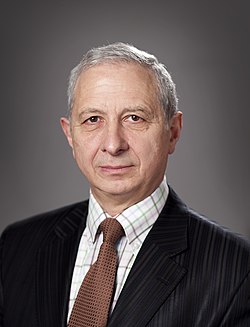Gerdzhikov Government | |
|---|---|
| 95th Cabinet of Bulgaria | |
| 27 January 2017–4 May 2017 | |
 | |
| Date formed | 27 January 2017 |
| Date dissolved | 4 May 2017 |
| People and organisations | |
| President | Rumen Radev |
| Prime Minister | Ognyan Gerdzhikov |
| No. of ministers | 20 |
| Member party | Independents |
| Status in legislature | Provisional Government |
| History | |
| Predecessor | Second Borisov Government |
| Successor | Third Borisov Government |
The ninety-fifth Cabinet of Bulgaria took office on 27 January 2017, following the resignation of the Second Borisov Government. The government led the country through to the 26 March parliamentary elections.